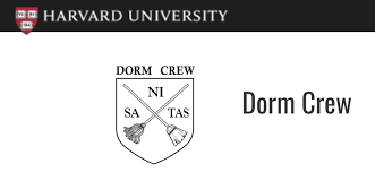HT: Vanderleun.
“How Quickly the World Owes Him Something He Knew Existed Only 10 Seconds Ago”.
21st Century, Der Untergang des Abenlandes, Entitlement, Technology
Millennial Snowflakes Puzzled and Bummed Out Over Unequal Treatment of People Without Money
Entitlement, Harvard, Harvard Fall Clean Up, Millennials
Harvard has a traditional Fall Clean-Up, in which freshman student employees arrive early to make a few bucks tiding up Harvard’s residential houses in preparation for the arrival of the entire undergraduate student body.
Although cleaning dormitory rooms and bathrooms is work, Harvard tries to put an element of fun into it as well.
For more than sixty years, Dorm Crew has welcomed Harvard first-years to campus for our annual Fall Clean-Up (FCU). Created in 1951, Dorm Crew is a student employment and leadership program that is entirely managed and operated by Harvard undergraduates. Today, Dorm Crew offers employment opportunities, leadership development, advising resources, and pre-orientation programing to more than 800 students annually. Each year, 300 incoming first-years join FCU to have fun and work hard while cleaning and preparing the dorms for student move-in. Throughout the week, students will have the opportunity to explore and engage with Harvard’s campus and community through various planned events. …
Year after year, students have found Fall Clean-Up to be a rewarding experience that offers a great community of friends and provides an unrivaled introduction to the diversity of the Harvard community, the aged beauty of Harvard’s student residences, and the vibrant life of Harvard Square. Under the guidance of our upperclassman captains, we aim to deliver a Fall Clean-Up experience that truly orients students to what life at Harvard is all about.
Some alumni report that they enjoyed the experience:
As I reflect back on my life, that first week or two of freshman year, with the bonding with my fellow freshman Dorm Crew members, was an extraordinary stress reliever as we found out about each other and that we were all scared to death that Harvard had made a mistake admitting each one of us! I will never forget those initial few weeks in Cambridge.” —Ray Peters ’69
“I loved FCU because I met some of my best friends at Harvard and found a community that has been really important to me throughout my time in college.â€
—Sarah E. Lagan ‘19
—————————
But the Harvard Crimson staff stroked its collective chin, and decided there was a PROBLEM here.
Oh, migod! Who would have imagined? Not everyone at Harvard is rich, some people are there on scholarship and need to take jobs in order to earn money. Everyone is not the same. It just isn’t fair!
Bedford felt out of place, just as the sight of trash in Murdock’s sink left him feeling neglected by the University. From the beginning, Bedford and Murdock felt that the University deemed them different from their peers.
It took Bedford some time to pinpoint exactly why he felt alienated. Amidst meeting other students and recovering from jetlag, he did not look around and think, “Oh, we’re all here because we’re poor and we need money.†At the time, he says he “had no conception of the†— here, his voice lowers in emphasis — “disparity that is present on this campus between rich and poor.†But shortly into his time at Harvard, he began to reconsider the way Fall Clean-Up functions: It distinguishes between the students who need to earn quick money for school supplies and those who do not.
Many of the students who end up participating in FCU would have liked to do other programs. “What turned me off about FUP at the time wasn’t what it was, but what it wasn’t. And it wasn’t a program that paid me,†Ibrahim says. “Fall Clean-Up gave me dollars, and I needed that.â€
During pre-orientation, some students can afford to do what they love. Others don’t have that luxury.
I’ve noticed the exact same problem in life after college. If you want something, if you want a home with electricity, heat, and in-door plumbing, you actually have to get a job and work to pay for all of it.
How Entitled Are Today’s Yale Undergraduates? This Entitled
Bursary Jobs, Entitlement, Yale, Yale Daily News

Josh Diaz is Class of ’20, Morse College.
Yale junior Josh Diaz sees no reason he ought to have to work a bursary job as a student at Yale, while other students from wealthy families, whose parents are paying $72,100 this year, do not.
I was hired to work events such as Mellon Forums and College Teas, events that Yale is proud to offer to its students. I feel both trapped and embarrassed working these events. I came here to be a student. Instead, after class, I slip into my loose khakis, worn-out dress shoes and black polo to go to work as my suitemate takes an afternoon nap. As the events begin, I stand on shift while my peers indulge in cheese, dessert and insightful conversation. After the event is over and everyone leaves, I stay to clean up after the students and guests and make sure the Head of College’s house is ready for the next event. By the time I get to the library to begin studying, my peers are finishing up and going to bed.
What strikes me most is the indignity of the divide: who gets to be a student and who has to work. As it turns out, getting into Yale was not enough to escape where people believe I belong: working. As a non-white, working-class Latino man, Yale expects me to work. And moreover, the money I make goes right back to the university. I work to make the magic happen for my peers.
This year, I frantically moved all my stuff into my room early to get back to work — preparing for the first years to arrive. All my days were focused on fun for the first years: move-in, first-year reception and other camp Yale activities. At the end, I was overwhelmed, overworked and under-appreciated.I have grown incredibly close to my friends at Yale and love the communities that surround me. However, the student income contribution still divides us.
As classes begin, I know that this divide is already beginning to take place. Those who are on financial aid will have to work. Those who are on financial aid will have to pay. Until Yale eliminates the Student Income Contribution, students on financial aid will continue to feel disrespected, unsupported and unwelcome at Yale. That’s how I feel.
Mr. Diaz’s attitude would, of course have been absolutely inconceivable to members of earlier classes at Yale. Students from humble backgrounds fortunate enough to have been admitted to this elite college in earlier (and better) days thanked their lucky stars at having been given the priceless opportunity to move upward in the world and were only too happy to work hard to earn it.
I make a practice of reading lots of old novels and memoirs offering accounts of undergraduate life at Yale in different eras. Mr. Diaz would be appalled, I can tell you, to learn what real inequality was like in the 19th Century. Poor boys worked regular jobs and lived in miserable hovels in the New Haven slums, eating the cheapest food and often skipping meals, to get through Yale. People without family money had little opportunity to partake of the pleasures of student life, and poor students were certainly not treated as equals by the rich.
I was recruited to attend Yale by an alumni representative from the Class of 1926. He was a wealthy and successful executive, but he had come to Yale the son of a poor Presbyterian clergyman from New Jersey. He absolutely needed to work his own way through Yale. That meant not just earning a small “student contribution,” but earning the money to pay for his tuition and for his room and board somewhere.
He would have dearly loved, he once confessed to me, to have won a letter on the Yale Football Team, but he simply did not have time off for football practice. He had to work. He somehow managed to win a letter finally in LaCrosse, which apparently involved a much smaller time commitment. He also did not have time for singing groups and he had no money to join fraternities or clubs like Mory’s. He was tapped by no Senior Society. But he did not feel in the least wronged. He was grateful to Yale and devoted to her service all his life. If he were alive to read Mr. Diaz’s editorial, I expect that he would be simply astonished at that gentleman’s perspective and depressed at the changes in values and education that are responsible.
And, oh yes, I had bursary jobs myself. I can remember, for instance, having to get out of bed before dawn to go make toast in Commons. I also bused trays, and loaded the dishwasher. I used to wear a necktie under my white coat and I’d make a point of appropriating a carnation or rose from one of the vases on the tables for a boutonnière. I decidedly approved of the bursary job system, and I liked the feeling of doing my bit to pay for being at Yale. I didn’t like getting out of bed early, and I definitely disliked burning my fingers handling hot toast, but I took pride in doing the right thing. Unlike Mr. Diaz, I was quite conscious of the enormous favor Yale was doing me, and I was very much aware that lots of others had had to work before I ever came along.






